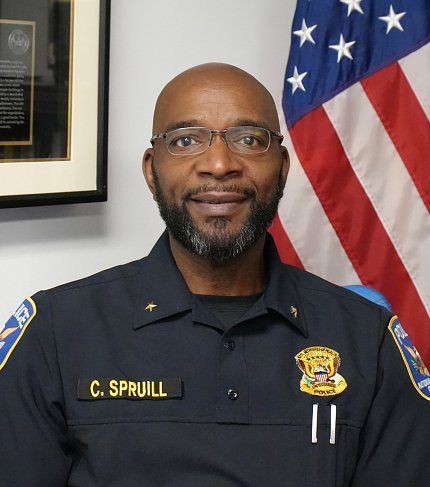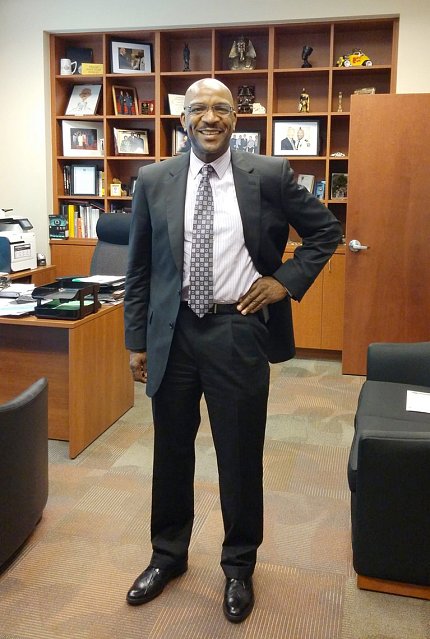Power of Community
New Police Chief Spruill Settles In
NIH welcomed new police chief Cleveland Spruill Sr. on Nov. 6, 2023. His career has spanned 30-plus years and multiple departments.
Growing up in a disadvantaged part of New York City, Spruill didn’t have a favorable view of law enforcement, but that began to change as he relocated to Richmond, Va., with his family, entered adulthood and enlisted in the Army. He served for four years and then decided to pursue a career as a lawyer. A police officer seemed like a natural steppingstone, so Spruill took a job with the police department in Alexandria, Va.
“I’d planned on being there for two or three years, but ended up staying for 27,” he recalled. The action-packed nature of the job appealed to him, but so did the opportunities to have meaningful connections with the community.

Photo: Eric Bock
One opportunity has come through Spruill’s love of football. The Alabama Crimson Tide fan has coached all ages of youth football, from five-year-olds through high school, and he appreciates how the sport enables him to direct his players in a positive direction and also connect with the community.
In Alexandria, Spruill was far more well-known in the neighborhood as a football coach than as a police officer.
“If you asked people who Officer Spruill was, a few might know. But if you asked them if they knew Coach Spruill, a lot more people would start nodding,” he said.
The rapport he developed as Coach Spruill meant people felt comfortable confiding in him in areas that Officer Spruill could help—ranging from food insecurity to domestic violence.
He has also encouraged community engagement activities among the police forces he has worked in, such as Halloween “trunk”-or-treat events, volunteering with Special Olympics and hosting food giveaways during Covid. Other events, such as “Shop with a Cop” or “Cops and Barbers,” allowed children special one-on-one time with officers as the kids hunted for Christmas presents or got haircuts—which were paid for by the police force.
In the Alexandria Police Department, Spruill “served in pretty much every aspect of policing you could think of,” eventually ascending to deputy chief. He later served as chief of Huntersville Police Department in North Carolina, followed by Athens-Clarke County Police Department in Georgia.
The Covid-19 pandemic struck when Spruill was in Georgia. His then-fiancée lived in Maryland, and due to pandemic-induced restrictions, he was only able to see his partner and family twice in 2020.
“I came to realize that I needed to put family ahead of work,” he said.
He moved to Maryland permanently in April 2022. He had no job lined up, but also knew he wasn’t ready to retire. He became the chief of police and public safety director for the University of the District of Columbia, and then applied for his current NIH position a year later.
What inspired the change? Spruill had a high opinion of the NIH police force already, from interactions during training exercises and other joint activities while he worked in Alexandria.
“I’ve always considered NIH law enforcement to be a high-performing and professional [department],” he said.
What piqued his interest, though, was his stepson’s internship experience that led to a budding biology career.
“The experience he had here at NIH transformed him into a contributing citizen and scientist,” and inspired Spruill to apply.
He began in early November and is “very happy to be here.” As there was a two-year gap between Spruill’s appointment and the previous chief’s departure, there is a lot to do, but Spruill is confident in his employees.
“[The NIH police force] is an outstanding organization with highly committed and outstanding employees,” he said.

Are there any differences when it comes to policing a federal agency after a career of municipal policing?
Not really, according to Spruill: “Policing is the same no matter where you are.”
NIH does have more of an emphasis on security, he noted, from protecting scientists and their research to ensuring safe and uneventful visits of public figures.
One major priority for Spruill is increasing rapport with the broader NIH community. With his background as a disadvantaged youth and later as a police officer working with the public, he understands that there is a disconnect between law enforcement and the people they serve.
“I think that, not just at NIH, but globally, we as law enforcement need to do a better job of explaining what our rules are and why we have to do things a certain way,” he said.
He sees opportunities to do that in engagement.
“I’d like to let the public see our employees in a positive light, rather than have their first encounter be in an accident or getting a ticket,” he reasoned.
Spruill is also committed to promoting equity, diversity and inclusion. He is keenly aware of its importance in his line of work.
“People inherently trust other people who look like them…the more that we look like the community we serve, the more comfortable they are going to be in engaging with us.”
What can NIH’ers expect from the police department in the future?
Expect to see some education and awareness initiatives on traffic safety on campus, Spruill said. Drivers should also slow down and pay attention, and pedestrians should consider staying off their phones while crossing the street.
If any offices or community stakeholders would like to collaborate with Spruill, his door is open.
“I would love to have the opportunity for folks to interact with us and talk about how we can work together,” he said.
